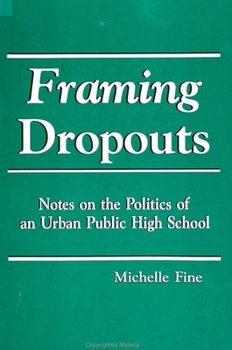Framing Dropouts: Notes on the Politics of an Urban Public High School (S U N Y Series, Teacher Empowerment and School Reform)
Select Format
Select Condition 
Book Overview
Michelle Fine is Associate Professor of Psychology in Education at the Graduate School of Education, University of Pennsylvania.
Format:Paperback
Language:English
ISBN:0791404048
ISBN13:9780791404041
Release Date:March 1991
Publisher:State University of New York Press
Length:320 Pages
Weight:0.96 lbs.
Dimensions:0.7" x 6.0" x 9.0"
Customer Reviews
1 rating
Book Review
Published by Thriftbooks.com User , 15 years ago
Michelle Fine brings us a chilling ethnographic portrayal of a New York City high school from 1978 to 1985. She follows an incoming class of students and reports on their experience. She also follows the teachers and administrators who are responsible for these students. Alarmingly, two-thirds of the incoming 1978 cohort had not graduated six years later in 1985. When that many students are not graduating, it is no longer the fault of the students, but the responsibility of those in charge. The greatest strength of Fine's work is her shift in focus from the students who drop out to the systems they drop out from. By doing this, she does not fall into the trap of "blaming the victim." As a result, some of the seemingly insurmountable deficiencies students bring to school such as poverty, language deficiency, cultural depravity, lack of parental support, and family problems are no longer the focus of improving public education. Rather, the roles and functions of teachers, faculty, administrators, and public officials can be studied, scrutinized, and improved to reach better educational outcomes for urban students in public schools. Fine also does a magnificent job of using her observations and direct quotes from students, teachers, and administrators to illustrate her conjectures. For example, Fine writes about a discussion with a group of school personnel about her finding that the majority of the students at that school were dropping out. The principal stated, "We do what we are told to do by the Board" (p. 68). The attendance coordinator followed with, "We have a problem. These kids have been gone for more than twenty days, some hundreds, and that's since junior high school" (p. 68). Next, the guidance counselor added, "We do throw students out of here for no good reasons. They feel terrible. We deny them their education. Black kids especially. They care a lot. I am concerned about the kids discharged in large numbers" (p. 69). One of the deans followed with, "I have twenty-five kids graduating who have been on contract; the others, they have to go. That's how we keep control here" (p. 69). Another dean chimed in, "They don't see how dangerous these kids are" (p. 69). Finally, the dean of guidance provided a synopsis of the discussion and the situation at the school, "We are working within the school at cross purposes. And we feel the impact on the streets as citizens, we are not working as a team" (p. 69). From this conversation, we can see how different faculty members within the same school have different concerns and different visions that are counterproductive for individual student success. Fine claims, "My argument held that the structures and policies of urban comprehensive high schools require no conscious malintent on the part of individual educators to produce systematically inequitable outcomes" (p. 179). Although all the faculty members above were doing their best to serve the students without malice, the system itself was to bla






